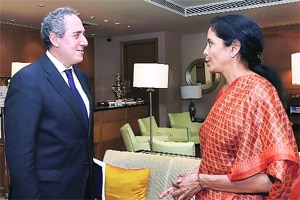India’s move to introduce patents-disabling compulsory licensing (CL) provision akin to the one in the pharmaceutical sector in the larger manufacturing sector, stringent localisation norms for defence, solar power and retail sectors and its “high” import tariffs on information, communication and technology (ICT) products could adversely impact US investments in the ‘Make in India’ programme, the US warned on Tuesday.
The Indo-US Trade Policy Forum, which met after a gap of four years on Tuesday, agreed to continue their engagement on visa related issues and enhance market access for agriculture products.
These issues were discussed by commerce and industry minister Nirmala Sitharaman and US Trade Representative (USTR) Michael Froman.
Speaking to reporters after the meeting Froman said, “Whatever the debate is around CL with regards to the pharma sector, taking that same argument to the manufacturing sector and suggesting that CL will spur manufacturing, is something that we have concerns about.”
On localisation norms, Froman said, “studies show that where that (localisation norms) are used, you tend to end up with an industry that is less globally competitive, with higher costs for producers and consumers and lowering consumer welfare”. The government invokes CL to allow a firm other than the patent holder to produce and market a patented product or process without the consent of the patent owner during public health emergencies /public non-commercial use. It is one of the flexibilities in the World Trade Organization’s Trade-Related Aspects of Intellectual Property Rights. (FE & PTI)

